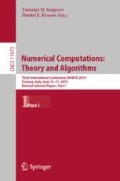Abstract
The following claim was one of the favorite “initiation question” to mathematics of Paul Erdős: for every non-zero natural number n, each subset of \(I(2n)=\{1,2,\dots ,2n\}\), having size \(n+1\), contains at least two distinct elements of which the smallest divides the largest. This can be proved using the pigeonhole principle. On the other side, it is easy to see that there are subsets of I(2n) of size n without divisor-multiple pairs; we call them n-sets, and we study some of their combinatorial properties giving also some numerical results. In particular, we give a precise description of the elements that, for a fixed n, do not belong to every n-set, as well as the elements that do belong to all the n-sets. Furthermore, we give an algorithm to count the n-sets for a given n and, in this way, we can see the behavior of the sequence a(n) of the number of n-sets. We will present some different versions of the algorithm, along with their performances, and we finally show our numerical results, that is, the first 200 values of the sequence a(n) and of the sequence \(q(n):=a(n+1)/a(n)\).
Access this chapter
Tax calculation will be finalised at checkout
Purchases are for personal use only
References
Aigner, M., Ziegler, G.M.: Proofs from the BOOK, 4th edn. Springer, Heidelberg (2010). https://doi.org/10.1007/978-3-642-00856-6
The On-Line Encyclopedia of Integer Sequences. http://oeis.org/A174094. Accessed 3 June 2019
Liu, H., Pach, P.P., Palincza, R.: The number of maximum primitive sets of integers (2018). arXiv:1805.06341
Vijay, S.: On large primitive subsets of 1,2,...,2n (2018). arXiv:1804.01740
Bindi, C., et al.: Su un risultato di uno studente di Erdős. Periodico di Matematiche, Organo della Mathesis (Società italiana di scienze matematiche e fisiche fondata nel 1895), Serie 12, Anno CXXVI, N. 1 Gen-Apr 2016, vol. 8, pp. 79–88 (2016)
Bindi, C., Pellegrini, M., Pirillo, G.: On a result of a student of Erdős (submitted for publication)
Acknowledgments
This work is partially supported by the research projects “IoT&B, Internet of Things and Blockchain”, CUP J48C17000230006, POR Calabria FESR-FSE 2014-2020.
Author information
Authors and Affiliations
Corresponding author
Editor information
Editors and Affiliations
Rights and permissions
Copyright information
© 2020 Springer Nature Switzerland AG
About this paper
Cite this paper
Caldarola, F., d’Atri, G., Pellegrini, M. (2020). Combinatorics on n-sets: Arithmetic Properties and Numerical Results. In: Sergeyev, Y., Kvasov, D. (eds) Numerical Computations: Theory and Algorithms. NUMTA 2019. Lecture Notes in Computer Science(), vol 11973. Springer, Cham. https://doi.org/10.1007/978-3-030-39081-5_34
Download citation
DOI: https://doi.org/10.1007/978-3-030-39081-5_34
Published:
Publisher Name: Springer, Cham
Print ISBN: 978-3-030-39080-8
Online ISBN: 978-3-030-39081-5
eBook Packages: Computer ScienceComputer Science (R0)

